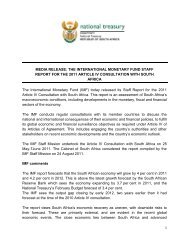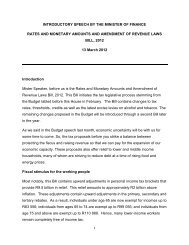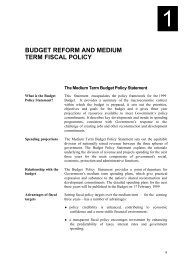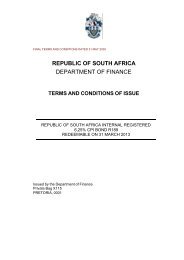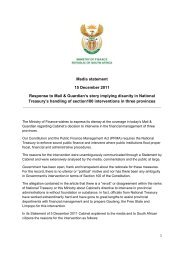Annual Performance Plan Jaarlikse ... - National Treasury
Annual Performance Plan Jaarlikse ... - National Treasury
Annual Performance Plan Jaarlikse ... - National Treasury
You also want an ePaper? Increase the reach of your titles
YUMPU automatically turns print PDFs into web optimized ePapers that Google loves.
The re-capitalisation plans of the six colleges are integrated with the college’s strategic plans and, therefore, fully support the<br />
programme niche areas identified through the MEDS process. In this way the seamless integration of the objectives of recapitalisation<br />
and human resource development priorities of the Western Cape are being achieved.<br />
The re-capitalisation grant is not focussed on the addition of new infrastructure. It is focussed on the upgrading and re-fitting<br />
of colleges for their new task as FET Colleges. It is, therefore, essentially about the replacement of outdated machinery and<br />
equipment. FET colleges were created from the defunct infrastructure of Technical Colleges that had been grossly underresourced<br />
for many years and in the apartheid era – subject to very uneven investment. In addition, the investment does not<br />
provide for additional personnel – a critical shortcoming in the current system in the Western Cape and a serious growth<br />
retardant factor. As a result of these factors, almost no growth (to negligible growth) in student numbers can be expected at<br />
this stage. What can be expected is an increase in the quality of human resource development, and a better correlation<br />
between education and training on offer and the socio-economic needs of the Province.<br />
A.4.4 Adult education and training<br />
ABET delivery, including curriculum delivery, governance and management, is aligned with the demands of provincial and<br />
national initiatives, e.g. the HCDS and the Expanded Public Works Programme (EPWP).<br />
Provision is being made for 2 500 learners annually who will benefit from skills focused curricula in ABET levels 1 -4 and<br />
further education; reinforcing the imperative of lifelong education.<br />
Increased access to ABET is being ensured through structured Level 1, 2 and 3 modularised curriculum offerings in centres<br />
and targeted capacity building and training interventions for centre management and governance structures. Special<br />
attention will be given to the electives at ABET Level 4, i.e. Ancillary Health Care, Mathematics, Science and Technology.<br />
Unqualified and under-qualified educator qualifications will be improved through Learnerships in conjunction with the ETDP<br />
SETA.<br />
The ABET sector is being transformed to ensure that it delivers programmes that will benefit those who have been excluded<br />
from the education system for various reasons. The sector and programmes offered have been streamlined, whilst<br />
Community Learning Centres (CLCs) are being made more accessible to those who have been excluded from any form of<br />
formal, basic education.<br />
The retention rate and throughput rate in both basic and further education at adult centres will be improved through offering<br />
more appropriate programmes, improved management and governance and through improved delivery mechanisms.<br />
More learners will be attracted through improved marketing in communities using various media. This will highlight the<br />
importance and benefits of Adult Learning and aim to break down the negative connotations and stigma attached to being<br />
illiterate.<br />
Accredited skills programmes with a focus on workplace learning, the unemployed, women and rural areas will continue to<br />
form a cornerstone of curriculum delivery in ABET centres from 2007 - 2010. Such programmes focus on the key industries<br />
in the Western Cape, e.g. Tourism, Construction, Manufacturing and Retail. Programmes will be offered in conjunction with<br />
the SETAs and the Department of Labour.<br />
Existing partnerships with 8 provincial departments will be maintained whilst new partnerships with other provincial<br />
departments and industry will be forged.<br />
A critical review of current delivery with recommendations of how to improve/change ABET provisioning through feasibility<br />
was conducted in 2006. This was done to ensure CLCs are geared towards supporting the outcomes of the HCDS. The<br />
review focussed on the management and governance, operational hours of centres, provision of resources, relevance of<br />
curriculum offered and the effectiveness of assessment policies. A preliminary feasibility study on the implications of<br />
developing a possible full-time ABET centre was conducted.<br />
Targeted training for centre management, governing bodies and educators will be conducted to ensure CLCs can respond to<br />
the challenges of a transformed ABET sector.<br />
<strong>Annual</strong> <strong>Performance</strong> <strong>Plan</strong> 2007/08 – 2009/10<br />
17




